Whitwick Gates was nothing more than a skeleton of what it once had been. Its bones were stripped of flesh long ago by battles fought and lost, and the dead long buried and forgotten. It was a war that never ended but was fed often enough for it to quiet and allow the town to rebuild once again.
In a place that never changed, nothing ever felt the same. Death did that to places where it strangled their children more often than not. It had hung its hat in Whitwick many years before and waited, comfortable in the respite we rarely gave it. It was always there, always plotting, and was always sated in the end. You couldn’t starve Death. He ate his fill no matter how hard you prayed or bargained. Our demise went cheek by jowl with the coming of the Fae. It always had and always would. The mortal realm’s fate was to pay tithe to Gods who never cared much for mankind. Our God had left so long ago that none of us could remember His name. I didn’t blame Him. Most of us didn’t. We’d have left this hellhole if given half the chance, too.
Instead, we tried to forget. But it was hard to ignore when each time the fog came, it reminded us we could never really disregard the fate of our little town and its young, those the Fae would pick and choose from. But halflings, half of this world and half of theirs, were cursed with the knowing. We were always aware of when our time was coming for the Taking, but none spoke it aloud. Saying the words felt too close to blasphemy, offering ourselves, guaranteeing we would be next. It was tantamount to cursing the God who wasn’t here, to begin with. Whether we said the words or not, the Fae always came to collect their Crow, and when they did, the town filled the hat of death to the brim with souls who died in vain.
The fog came that Sunday morning when Mr. Grant, the local priest, cut an entire cord of firewood, as he did every Sunday before church—the wood he often donated to the widows of Whitwick every winter. Warm widows meant a packed church. That was the only reason people still went into the House of God. It had nothing to do with being saved by the All-Mighty. No one could protect us in Whitwick, not even our God.
Today, Father Grant started with his dog, Harold. When Mrs. Grant woke to the noise and went outside to see the commotion, she, too, kissed the ax wielded by Father Grant and became part of row number four. Her purple hair curlers hooked on the wood in row five. The firewood, stacked in its ramshackle way, had become damp and red from the hound and Mrs. Grant. As I learned of the events at the farm, I remember thinking it would stink to high heaven once flame touched the hair this winter. Never would I say out loud the cause. I would ignore the heavy haze resting over our town, just like everyone else.
The backyard frenzy had attracted the neighbors from across the field. But by the time they had gotten to the Grant Farm, Mr. Grant was pouring himself a drink, not a drop of blood in sight. Mr. Grant, the God-fearing man he was, never drank, but this morning was different. The air on the farm faintly smelled of drink, sugarcane, clover and a butcher’s block. Father Grant was kind enough to offer the Thompson boys a glass of their own. Reaching for a drink, Mr. Thompson saw what the morning fog had brought in. All farms smelled of meat and death, but firewood didn’t wear purple hair curlers, nor did they wear a dog collar with fur still attached. I was told it was the curlers that tipped off Mr. Thompson and not the intestines holding the cord of wood in place. It’s weird, the things we notice when our little piece of the world is off kilter, when we choose not to believe one of the town's children would suffer a fate worse than Mrs. Grant, like the color of hair curlers or the number of times intestines can wrap around a cord of wood.
I had heard about the Grant Farm from Mary Jane Hilliard, the local gossip, the promised one. She was the one we never thought would ever go to the Fae. Each time the Fae came, she always received a free pass, as her father was Captain of the Guardians, the Gate guards. The Fae, however horrible they may be, were selective in what wars they were willing to pick. Mary hadn’t once felt the terror of their coming. I couldn’t bring myself to hate her, though. Most of the town would give anything to have the same freedom as she had, and we’d trade the neighbor’s children for it. Mary rang up my purchase at the local shop, telling the farm's gory tale as if she weren’t speaking of people who had always baked cookies and sweets for us children. She was more interested in being the first to know than being the first to sympathize.
While it made my gut twist, I didn’t connect it to the curse of Whitwick, of being a halfling—not then, anyway. Ignorance is bliss, and we in Whitwick tried to remain oblivious for as long as possible. It kept us sane. It allowed us to pretend we didn’t know the next child who would be Taken, and that child wouldn’t be from our line. It allowed us to live when our time could be up at any moment. After every Taking, we ignored their absence, save one day each year, marking their anniversary when they entered the Sidhe. We said it was to celebrate that they were still alive in Elphame, since the Fae hadn’t come for another. But deep down, we celebrated another year a new child hadn’t become a Crow. We were a morbid bunch to the core.
In my seventeen years, I had learned a number of truths in Whitwick Gates. One, people are rarely as sorry as they should be, and many of us here had a lot to be sorry about after the fog came and went. And second, the Fae made you realize number one in the most creative of ways. And three, as a Darkmore Witch, I was sure the town was going to hell in a handbasket, weighed down by a fog I knew was coming. I could try to ignore it all I wanted, but I could feel it in my bones. Hell would be loosed upon our town. The Fae would see to it. They always did. They always would.
I had read all the Darkmore journals and had believed enough of the Whitwick folklores to know that no one had ever survived a Taking, the becoming of a Seven-Year Crow, since my greatest of grans had woven the curse that made the Gate to Elphame a one-way street for Crows. Only stories passed down through the halfling lines survived intact, and there weren’t many halfling lines left. Soon, the stories would fade, with no one left to tell them.
Long ago, Crows who returned were never whole again, not entirely. Their minds were broken. They birthed halflings upon their return, against their will, and faded into a bottle of hysteria. Drink was the only sanity they could find. They needed constant supervision so they didn’t end their lives. I thought it would have been merciful to allow them an end, but my vote didn’t count. I was just a child, old enough to die but too young to speak of death. But since Crows could no longer return and didn’t live out their seven years, the Fae came every year. Their coming more frequent was a punishment for a curse made to protect the rest of us.
We had Guardians to send back the stranglers—Fae, who managed to get across the Gate between the Taking. And there were plenty who tried. Whitwick was home to many Fae who had escaped the clutches of Elphame. That should have told us all we needed to know about where the Crows were sent, if their own people were too scared to stay there. But no one spoke of it. It was easier to pretend than it was to know the fates of our children. It was easier to ignore than imagine.
I had dreamed of this day, every moment of it, from waking this morning, to the reaction I’d have when learning of our priest hacking his family to bits. While Harold and Mrs. Grant were becoming a ghost story to tell every time you lit a fire or burned your hair, a small yappy terrier was mauled by an orange feral cat. The terrier was scattered across the lawn at the school. Today was not the first day that cat had attacked another being, and I was sure it wouldn’t be the last. But with two happenings in one day, I started to pay attention, however unwilling I had been to think of it. It was like a hangnail you tried to ignore but kept snagging it just the same. With enough force, you’d tear down to the bone.
This would only be the beginning. The knowledge of what the rest of the day had in store for us tickled the back of my brain like an aneurism about to blow. But even then, with a dog scattered across a once-pristine lawn, I tried to ignore the horror coming to our fair town. It was how things were done here. We pretended like everything is fine, even when staring death in the eyes, which we did every day. But today, it was harder to ignore, given the sun rose to the fog and its devilish delights. No matter how hard I held my breath, I could smell it coming.
The fog was the telltale sign the Sidhe had opened, and the Fae would be close on its heels. They had one day to do their worst, and they did. And if the Crow died before the Fae could collect, they’d simply select a different one. There was never any winning or circumventing an oath with the Fae. We wouldn’t be free of the Taking until the Taking took place. The Guardians could do very little during this time to protect us. The agreement between our kind and theirs had limited what we could. So, each time the Gate opened, it was business as usual, and we were all up for grabs. Life is a bitch when it has no value.
Before I was halfway home, the town’s only twin sisters jumped from the roof of their house, both smiling and flapping their arms as though they could master their plummet to the ground. The teacher’s pigeons escaped and were now nothing more than glossy red pillow fill. In unison, they flew into the front of two big windows. Just before their untimely death, they were seen flying with the sisters, right up until they landed headfirst onto a freshly red-bricked pathway. Up until that moment, I thought the red brick looked a little too macabre, but now I’d agree with the color choice. When the sun rose tomorrow, the stain on the brick wouldn’t be as noticeable.
Whitwick had been built on legends, stories that were passed down from generation to generation. The hills crawled, the fog killed, creatures hunted, magick was real, and at any moment, you could die—or worse, be Taken. Most were stories to tell children to get them into bed on time. But the terrible ones, the ones that scared children the most, were as true as the bird flies. The stories that I hung onto from my childhood, spoke of the day we’d be free of the Taking. But those were fairytales, stories from old women long forgotten, nothing more. Still, I had always hoped we’d skip a Taking, that somehow they’d forget and stop coming altogether. But they never did…and never would. The Fae never forgot, even when we tried to. For three hundred and fifty-four days a year, we could pretend. And if that’s all you’ve got, then that’s what you did.
The thought that I could be next sent a shiver skittering down my spine. I was so close to being free. In almost one month, I would turn eighteen and no longer be at risk of being pulled into Elphame. The Fae never took adults. They would only take what was of most value to man, their children. In weeks, I would leave Whitwick, leave the Gate. When I returned, I’d be a Guardian and would protect the next generation of potential Crows.
Halflings always returned to Whitwick. The Gate, Elphame, called to us as fish to water and birds to the air. Elphame, to halflings, could be felt in the soul and very marrow of our bones. It promised freedoms and life forever. If you were quiet enough, you could hear it sing softly, pulling you toward it. None of us listened, and none of us were stupid enough to answer the calling. There were no promises in Elphame that a human or halfling could endure. Nothing from the mortal realm could withstand the Fae or their delights. But every now and again, a halfling would go off the dead-end and claw out their eyes and ears, trying to make it stop. They’d be found delirious by the Guardians at the border to the Gate, caked in dried blood, finally given in to the call. Those souls were usually locked up shortly after, too crazed to be left on their own.
As I walked down the sidewalk, the same route I had taken for years, in a town that had always felt the same, I passed the same haunted houses with their tenth coat of paint. I chewed the candy my father said smelled of times he’d rather forget. He never liked sugar or the smell of it. As typical the day was, save the carnage that was just as characteristic for Whitwick as the rain or the fear lining the eyes of the elders, I couldn’t keep my mind adrift. It kept pulling back to the corner store and the fear held back by Mary Jane Hilliard’s casual smile and perpetually cheerful voice. Hearing her voice tipping on the edge of fear had sent a shiver up my spine. I knew the Fae were close when I could see the careful lie of Whitwick melt from Mary’s eyes, replaced with knowing it was almost time. When we stopped pretending, the façade was over. None of us wanted the curtains to fall on our second-rate show.
With each step, paranoia started to coat my skin with sweat. I watched the smaller Fae, who were always here, scurry through the yards, seeking shelter. Fae glamour didn’t work on me as it did the others, leaving me the only one to see the warning. I glanced over my shoulder, unable to shake the feeling of being watched. The pit of my stomach twisted into a knot. The hairs on my arms stood ready for a pending assault. I didn’t need the Guardian’s bells to sound for me to know the Fae were about to cross the Gate. I felt it as my heart palpitated, like a tiny marching army across my ribcage.
The town looked as it always had, as it ever would—just trying to get by, knowing their young could be Taken at any moment. But out of the corner of my eye, I could see a thin veil of fog. Each time I focused my eyes directly on it, it was gone as though it had never been. I could feel the haze tickle the hairs on the back of my neck. Its coolness stuck to my skin like I had already run from it and failed. My stomach clenched, knotted in a burning warning. My muscles twitched in anticipation. My body knew, my heart knew, but my soul begged for another day.
Standing not thirty feet to my left was a man from Elphame. Faolan stood with his hands on his hips. He was powerful enough to cross between our realms, with or without the Gate opening. He wasn’t like the other Fae. Although my father would say different, he didn’t want the Gate between Elphame and the mortal world to remain open. Faolan’s father had helped the first Darkmore Witch escape Elphame to Whitwick Gates before the oaths between our worlds had been forged. I had kept my friendship with Faolan a secret for fear the town would hang me, for fear of my father’s anger. The Guardians hanged Fae sympathizers, and those who befriended a Fae were as good as dead. Oddly enough, there were many followers of Fae, a surplus of fools with misplaced trust. And so, there were also regular hangings. I didn’t attend, not because I was still a child, but because I couldn’t stomach pointless death. Whitwick suffered enough at the hands of Fae. Why we were driven to kill our own, I didn’t understand and didn’t care to.
Faolan only showed up in the open like this when something was wrong. As I turned to walk toward him, he shook his head and pointed toward my house. I glanced down the road, saw nothing and turned back to him. I frowned in confusion.
“Run!” His word carried over the still air and pushed my shoulders.
The bells finally chimed. Their ring carried over the hills and into the valley of Whitwick Gates. The Guardians, Gate watchers, the mortal army, sounded the alarms to warn the people of Whitwick that Fae had crossed the Gate. But I didn’t need the bells to know. I had felt them coming. When the chimes echoed, I ran like everyone else. But unlike everyone else, I knew there would be no place I could hide. There never was.
Whether I could hide or not, outside was not where I wanted to be when the full force of the fog came. I learned this the hard way years ago when I spent four hours in a corn maze chased by leprechauns. Up until that moment, I hadn’t known just how utterly terrifying a leprechaun could be. If it weren’t for the small gifts of magick I had and Faolan, I’d have never made it home. When the spell came back threefold, I puked for hours. Nothing is free, not even my blood right. The cost of magick, if too great, would take my life in return. I didn’t use it unless I absolutely had to.
I sped my legs up before my brain registered the run I had sprung into. My bowels quaked in fear. I had learned to trust Faolan over the years. He was righter than rain and never led me down a dark and twisted path that ended with me dead—not yet, but the day was young, and there was always a first time. Which, consequently, would be the last time. I wouldn’t care, though, because I’d be dead, and the dead don’t care about much and can’t complain, even if they did.
More than the warnings from Faolan, my gut told me to run. I trusted my instincts more than anything, given the number of times I hadn’t given them a second thought and had come close to death at the hands of the Fae. Faolan had kept me from death, the times I thought I was braver or smarter. Mortals never were, not when it came to what Elphame could deliver onto us.
I had felt the very moment the Gate opened and Elphame called out. As the Gate slid across the earth, it filled the air with its magick, like talons dragged along my bones. I sensed the Fae right down to my marrow. Hell was coming fast and nipping at my heels. The town was about to twist and turn into something grotesque and unrecognizable. Before the fog would end, I knew, at exactly six in the morning, which is when Mr. Grant had started on his woodpile, I would see my town burn once again. When the Fae came to play their games, it was nothing short of a nightmare of bodies and screaming, where none of us knew the rules or how to play. Even if we did, we never won.
For me, this would not end in the morning. It would never end for me. I would always be a witch, a halfling, and would feel them coming. If I were spared the Taking, I would spend the rest of my life fighting off the power of Elphame whenever they came. I would watch my neighbors kill each other, drunk on Fae, and I would struggle not to join in. None of us were truly safe—not me, not my neighbors, not the babes in their mothers’ bellies.
Through the fog, over the screaming, I could hear the laughter, the contemptuous shrill of enjoyment at our demise. The stench of sugar cane came on the wind, along with my name. We always heard our names. Sometimes for a game, and other times, you were named the Crow. The smell of sugar told me why my dad hated it and why I’d grow to dislike it as well. No adults ever ate sweets. After a lifetime of this, I understood why.
I bolted the doors, deceptively safe inside my home. I watched out of my window as the fog I had seen every time the Gate opened, thickened. As it grew, it bred violence with every minute that passed. The streets darkened, growing to pitch, as nightmares flooded our town and death woke from his respite. Neighbors fought neighbors, leaving bloodied messes we’d clean once the Gate closed again. Graves would be dug, and the shattered would be laid to rest. Markers would line the ground, reminding us of the horrible power of Fae, who broke us each time they came.
The bells didn’t stop chiming. The Fae had come for their sacrifice. And they always got their Crow, no matter how many of us died beforehand.









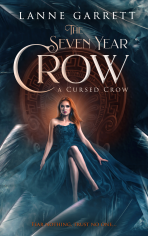

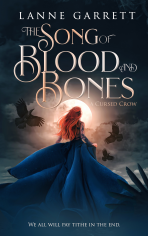
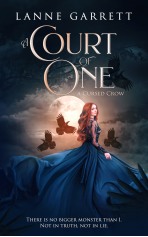
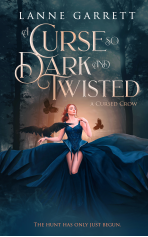



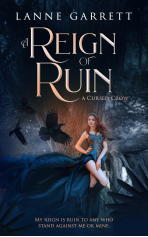
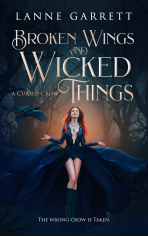
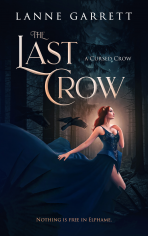
 Facebook
Facebook Twitter
Twitter